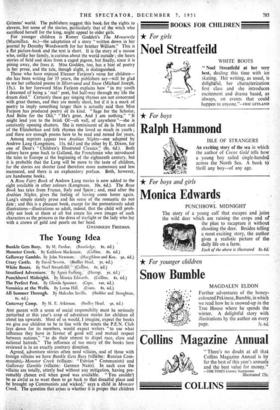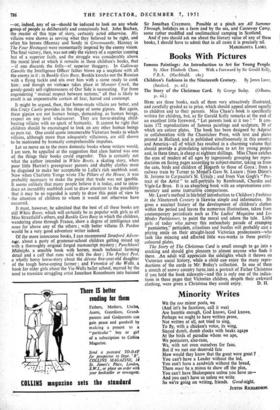The Young Idea
8s. 6d.) Castaway Camp. By M. E. Atkinson. (Bodley Head. 95. 6d.) ANY parent with a sense of social responsibilty must be seriously perturbed at this year's crop of adventure stories for children of aboM ten upwards. Most of us would, I imagine, expect the books we give our children to be in line with the tenets the P.E.N. Club lays down for its members, would expect writers "to use what influence they have in favour of good will and mutual respect between nations,"" to do their utmost to dispel race, class and national hatreds." The influence of too many of the books here reviewed is in an exactly contrary direction. Agreed, adventure stories often need villains, and of those with foreign villains we have Bunkle Gets Busy (villains: Russian Com- munists),- Monster Creek (villains: " Estvian" Communists) and Galloway Gamble (villains: German Nazis). In each case the villains are totally, utterly bad without any mitigation, having pre- sumably chosen evil when good was available. "You couldn't be so awful as to want them to go back to that dreadful place and be brought up Communists and wicked," says a child in Monster Creek. The question that arises is whether it is proper that children —or, indeed, any of us—should be induced to look on any whole group of people as deliberately and consciously bad. John Buchan, the master of this type of story, certainly acted otherwise. His villains were shown as serving what they believed to be right, and often his heroes (Hannay and Sandy in Greenmantle, Hannay in The Four Hostages) were momentarily inspired by the enemy vision; The final victory, then, was not Wily the victory of a superior cunning but of a superior faith, and the .struggle was considerably above the moral level at which it remains in these children's books, that —if one discards the frills—of superior thuggery. In Galloway Gamble the Intelligence Officer father blows up a seaplane with all the enemy in it ; in Bunkle Gets Busy, Bunkle knocks out the Russian with a flying tackle and sits over him with a stone ready to conk him ; and though no violeace takes place in Monster Creek, the goody-goody self-righteousness of Our Side is nauseating. Far from engendering "mutual respect between nations," all that is likely to result is an impenetrable curtain of fear, hatred and contempt.
It might be argued, then, that home-made villains are better, and this Crazy Castle provides in the shape of some gipsies. But again, these gipsies are not human beings, demanding, as human beings, respect on any level whatsoever. They are horse-stealing child- beating villains with no spark of humanity. It cannot be right that children should be encouraged to look on any other human beings as pure rat. One could quote innumerable Victorian books in which villains, although more than adequately villainous, are still shown to be motivated by humanly comprehensible impulses.
Let us move on to the more domestic books whose writers would, I am sure, be appalled at the suggestion that class hatred was one of the things their books could engender. This is certainly not what the author intended in White Boots, a skating story, when poor little Harriet's greengrocer parents and shabby clothes must be disguised to make her acceptable to Latta's rich snobbish aunt. Now when Charlotte Yonge wrote The Pillars of the House, it was probably necessary to make the point that trade was not ignoble. It seems unlikely that many people believe it is today, and to intro- duce an incredibly snobbish aunt to draw attention to the possibility that it may be so regarded is surely to draw this point of view to A the attention of children to whom it would not otherwise have occurred.
It must, however, be admitted that the best of all these books are • still White Boots, which will certainly be as popular with girls as all Miss Streatfeild's others, and Bunkle Gets Busy in which the children, • wandering alone through France, show a degree of intelligence and nous far above any of the others ; with better villains D. Pardoe would be a very good adventure writer indeed.
Of the more innocuous books, I can recommend Stratford Adven- ttge, about a party of grammar-school children getting mixed up with a thoroughly original forged manuscript mystery ; Punchbowl Midnight, a sensible book with horses, much technical farming detail and a calf that runs wild with the deer ; The Perfect Pest, a wholly horsy horse-story about the devote five-year-old daughter of the tough horse-coping farmer ; and Veronica of the Wells, a book for older girls about the Vic-Wells ballet school, marred by the need to translate struggling artist Jonathan Rosenbaum into baronet Sir Jonathan Craymore. Possible at a pinch are All Summer Through, holidays on a farm and by the sea, and Castaway Camp, some rather muddled and unclimactical camping in Scotland. And if you should ask me about the literary value of any of these books, I should have to admit that in all cases it is precisely nil.
MARGHANITA LASKI.



















































 Previous page
Previous page